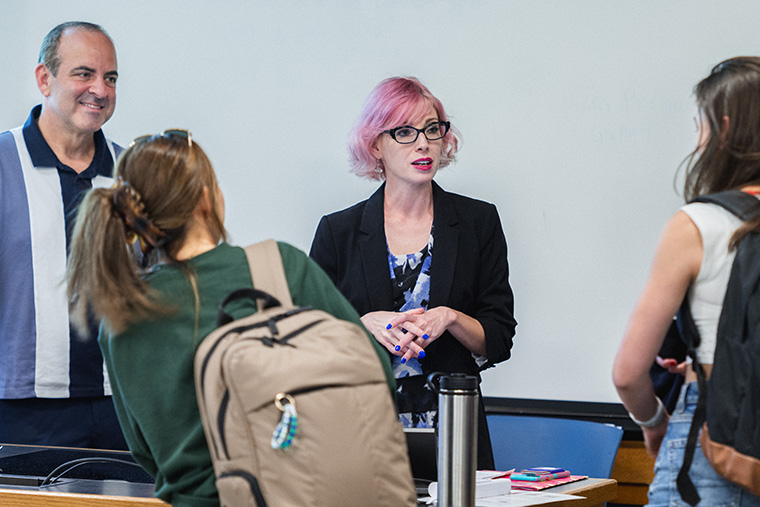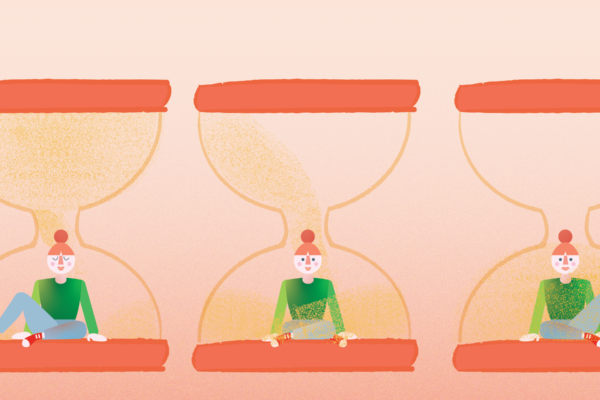Barbie and … “Joey”?
It’s less than 5 minutes into an interview on media literacy with Eileen G’Sell, MFA ’06, senior lecturer in writing in Arts & Sciences at Washington University, and she’s already covered 33 years of media influence.
Barbie, of course, is the movie of the summer, one G’Sell reviewed for the local alt-weekly Riverfront Times and Detroit’s Metro Times. “I was surprised by how subversive it was,” she says of the movie. But an obscure pop song from 1990?
“I loved this song,” G’Sell says, sitting down for the interview as the one-hit wonder from the group Concrete Blonde blares on the coffee-shop sound system. She recounts how she used to sing it into a hairbrush microphone as a 10-year-old, then unaware that the lyrics describe a co-dependent romantic relationship with an alcoholic.
The interviewer, just a few years out of college at the time, recalls being well aware of the lyrics, and she and her friends hoped they would never pine for a passed-out-on-the-floor drunk. “Right?” G’Sell says. “One piece of media can bring an entirely different experience to anyone at any given time.”
In the other words, when it comes to media literacy, understanding audience is everything.
G’Sell has plenty of experience in that area. She’s been teaching at WashU since earning her MFA in writing in 2006, while at the same time establishing herself as a poet, writer, film critic and cultural commentator with essays in such outlets as Salon and Hyperallergic and The Hopkins Review. She’s a published poet, from chapbooks to the full-length collection Life After Rugby (2018). Her second book of poetry, Francofilaments, will be published in 2024 from Broken Sleep Books. And in July of this year, she was awarded the prestigious Rabkin Prize for visual arts journalism. A scholar with pink hair and sharp wit, she’s made a career out of understanding the audience she’s writing for and bringing a unique voice to whatever it is she wants to tell them.

This fall, part of her WashU workload includes co-teaching a new course for first-year students called “Modern Media: The Good, the Bad, & the Future” in Arts & Sciences’ Ampersand Program. The class, taught with former ABC News producer/TV executive John R. Green, AB ’90, is designed to appeal to students who are “fascinated by media, interested in media and alarmed by media,” G’Sell says. “We’re tracing the arc of how media has so rapidly changed, especially from traditional mass media to new media.”
This first semester focuses on theory and history, learning the “who” and “why” behind various modes of media. Next semester, the class shifts to content creation. Students might craft a multiplatform influencer campaign or a proposal for a documentary, culminating in a class trip to New York next spring.
“They’ll make content for those outside their own demographic,” G’Sell says. “We’re trying to actively get them to think creatively about their audience and how to appeal to that audience. And how that, in and of itself, is a creative act.”
“With media literacy, it’s not just about becoming literate in the media that’s targeting you. It’s also becoming aware that not all media targets you. And that media exists for all sorts of different reasons.”
Eileen G’Sell
G’Sell recalls growing up in the era of major network media — first with just three major networks, then a fourth and then the slow growth of cable. “I bet I watched tens of thousands of TV commercials not targeting my demographic, commercials peddling Metamucil or selling men’s deodorant.
“Remember there was a time when there was all this alarmist rhetoric about TV frying our brains,” she says. “But it gave you an awareness that you were part of something bigger — that there were entire communities different from you in age and interest. Students today have not had that experience. The vast majority of ads they’ve consumed originate in an algorithm employed by products and brands to target just them.
“With media literacy, it’s not just about becoming literate in the media that’s targeting you,” she says. “It’s also becoming aware that not all media targets you. And that media exists for all sorts of different reasons.”
G’Sell hopes the course teaches an awareness that other generations of media consumers might not be as narrow-minded or unsophisticated as the younger ones assume. And that’s something older generations need to learn, as well.
“I think for anyone teaching at WashU, the challenge is understanding that our students have a type of media literacy that we lack,” she says.
“I have learned enormously from students about the profound impact of so many different media platforms, be it Snapchat, TikTok, even LinkedIn. I had no idea, for example, that LinkedIn can become an incredibly self-aggrandizing competitive atmosphere for high schoolers. It’s turned out to be a very strategic medium that involves a lot of time and thought.
“I know I’ll continue to learn a lot,” she says.


